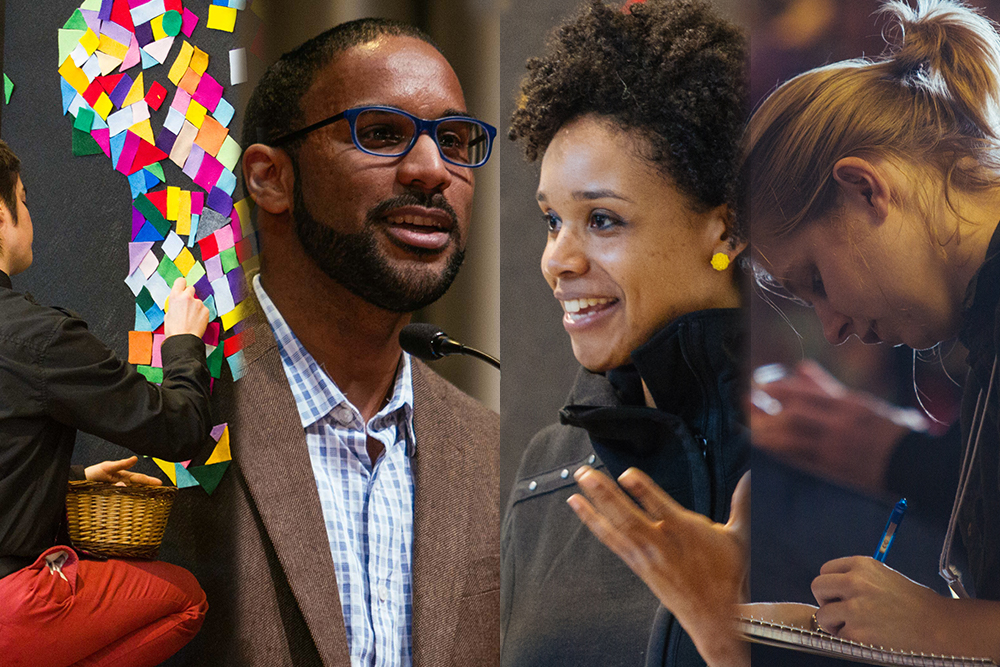“Some of us are more knowledgeable about what is happening with people 6,000 miles away, people we’ve never met, than what is
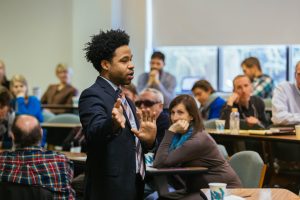
happening with our neighbors,” said Professor David Evans during Eastern Mennonite Seminary’s School for Leadership Training. “In the 21st century, we don’t need to travel 6,000 miles to meet others, ethnic others, racial others. We just need to open our doors or walk down the hall. We could do better to love our literal neighbors, those people closest to us.”
Evans’ point, made during a panel presentation on the themes of “neighboring” and “othering,” drew nods from listeners in Martin Chapel – all of whom had come to the two-day workshop to deepen knowledge and explore engagement with the diversities of politics, culture and theology in today’s modern church and culture.
Approximately 240 pastors and lay leaders from 16 states attended. At least eight denominations were represented: Brethren in Christ, Church of the Brethren, Church of Christ, Disciples of Christ, Mennonite Church USA, United Methodist, Lutheran and Unitarian Universalist. The event included four keynote addresses, workshops and a seminary faculty panel addressing the theme of “Yearning to Get Along … And Stay True to Ourselves.”
‘It is not enough to stay silent’
Participants ranged from veteran pastors to seminary students to laypeople such as Janelle Clark, of Newport News, Virginia, who is contemplating seminary studies. Pastor Sandy Drescher-Lehman has attended for the past seven years, anticipating by January, the need for collegial connection, spiritual sustenance and reflection “on where I was when I came last year — spiritually, emotionally and vocationally — and comparing that to my current place in the world.”
“As a white person living and working in a multicultural neighborhood,” Cynthia Lapp, pastor at Hyattsville Mennonite Church in Hyattsville, came to learn “more about racism and the ways white privilege functions … It is not enough to stay silent. Racism will not just fade away; we must act and speak.”
“I came to help uncover and discover what is often hidden in our racialized society and to consider how these forces of racialization are forming and shaping us as a church,” said John Stolzfus, Franconia Conference youth minister and campus pastor for Dock Mennonite Academy.
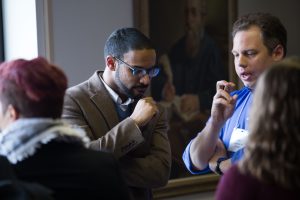
Reflecting after the event, Stolzfus questions: “How can we as leaders empty ourselves of our privilege and power in the self-emptying way of Christ in order to embody the incarnational love of God? To the extent in which we are not able to see or understand the suffering and struggle of the immigrant, racial minority, foreigner, sexual minority, or anyone who may be different from us reveals the poverty of our relationships. We need to be in proximity to and stand next to those who are “other” in order to truly be a neighbor.
With opportunities for worship, reflection and prayer in the midst of education, many came away with more questions than answers.
Mick Sommers, lead pastor at Ridgeview Mennonite Church in Lancaster, Pennsylvania, was “sobered by the realization that generations of attitudes and structure within the church will likely not be altered in a short span of time … I recognize within myself the need for a constant awareness and intentional mindfulness to counteract what has been my own socialization about race and power.”
Inequality and the ‘whitened Jesus’
Christena Cleveland, of Duke University Divinity School, and Drew G.I. Hart, of Messiah College, offered three extensive keynotes on the subjects of a practical theology of inequality, power and unity and the whitened Jesus, respectively.
Cleveland, a social psychologist, talked about the socialization of racism, the current politics of victimhood and related both concepts to Jesus’s statements and actions as a marginalized and oppressed person.
“If you looked to see where Jesus was socially located in every single one of his actions, how he emptied himself of his influence, platform and power … you’ll probably be astounded,” she said. “Jesus was always using his voice to make a point about what our relationships should be.”
Hart drew from history and culture to highlight the ubiquity of the “white European Jesus fixed in our places of worship,” an image that “bolsters a social system organized around racial hierarchy. “
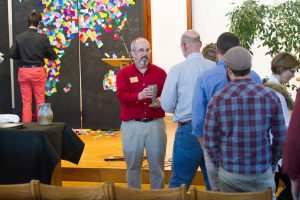
While lifting up the constructed image of the blonde, Nordic and explicitly non-Jewish Jesus, Hart asked, “Where do we go with that image … to recover our Gentile identity? None of us have a copyright on Christianity or Jesus … Let us remember that it is someone else’s story that shapes our lives.”
Selected seminars summarized
A complete list of seminars is available here.
Understanding the ‘other’ through the mirror/window of popular culture with Benjamin Bixler, PhD student, Drew University.
Bixler began with a clip of Kendrick Lamar’s Grammy Awards performance of “The Blacker The Berry,” in which the rapper and dancers, dressed as convicts, perform in the setting of a jail. Bixler discussed popular culture (movies, novels, music, etc.) as a way of engagement with “the other” on several levels: not only does the alternate world and characters offer alternate perspectives and provoke empathy, but the people who are discussing, analyzing or critiquing the work are also learning about themselves and each other.
Rebirth of a White Nation, with Dr. David Evans, EMS professor.
Evans facilitated discussions about white racial identity, a brief history of race in the United States, and the characteristics or qualities of “good white people” before asking the question “How might following Jesus be consistent or inconsistent with pursuing white status?”
“Race is national discipleship that teaches us the values we must have in order to belong to a certain status or group,” Evans says. “These values rival what Jesus calls us to be or to become … If we’ve been discipled into white nationalism, and no one was born white, then we’ve been converted into something that we need to be converted out of.”
How Do You Measure Life Change? The Role of Data and Measurements in Community Engagement with Wes Furlong, director of church development, EVANA network.
- Churches often take an input-focused approach to thinking about social/service work (e.g. pounds of food gather for food drive) rather than thinking carefully about outputs and desired impact.
- Serving communities, at its best, begins with careful work to fully understand context, strengths and assets and to ensure that all actors are involved.
- Those involved in social/service work need to avoid the temptation of taking a short-term or transaction view to their efforts and instead strive to take a systems view with a focus on the long-term.
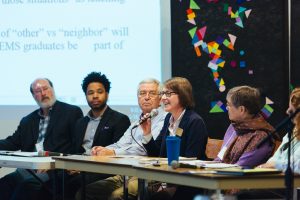
Dr. Andrea Saner speaks at the seminary faculty panel. She is joined by colleagues (from left) Kevin Clark, David Evans, Lonnie Yoder, Dorothy Jean Weaver and Emily Peck McClain. Not shown is Kenton Derstine.
Seeking the Peace of the City, with Dr. Johonna Turner, EMU professor, and Julian Turner, graduate student.
The Turners, both raised in the Washington D.C. area, also lived and worked there until moving to Harrisonburg. Johonna Turner was a public school teacher involved in peacebuilding and empowerment work with youth, while Julian Turner worked in social services, specifically with HIV-AIDS patients. The Turners led discussions, framed by Jeremiah 29.7, about perceptions of the choices inner-city citizens make and the visualization of a more peaceful and harmonious city. This was conjoined to a scriptural exploration of compassion as modeled by Jesus, leading to a model for action in connection, lamentation and amplification. Presenters emphasized that care and consideration for voices of all citizens, whether urban dweller or rural folk, because “we are all connected.”
Panel: Navigating the move from ‘other’ to ‘neighbor’ in the context of theological education.
A panel of seminary faculty — including Dr. Kevin Clark, Dr. David Evans, Dr. Lonnie Yoder, Dr. Andrea Saner, Dr. Emily Peck McClain, Dr. Kenton Derstine and Dr. Dorothy Jean Weaver — discussed the role of theological education and cross-cultural engagement in shaping the move from ‘other’ to ‘neighbor’ in students and communities; how society defines each of these terms; and issues of power and privilege in the seminary classroom.
